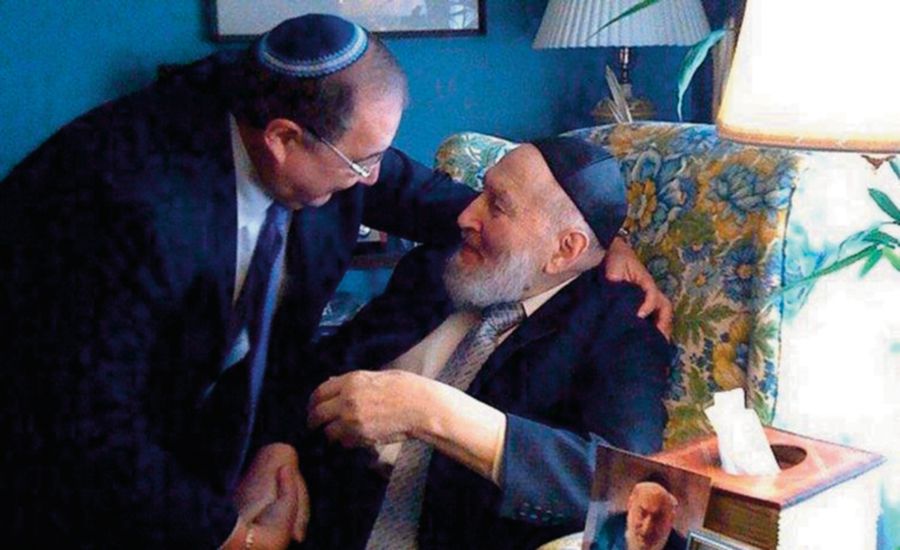The esteemed national director of the Anti-Defamation League, Abraham Foxman, was talking to a group of students and researchers at the Yad Vashem Holocaust History Museum in Jerusalem, sharing what had happened to him as a five-year-old in Lithuania in the fall of 1945.
To the students, the incredible story may have sounded like a legend, a parable. After so much time and so many retellings, it may have even seemed that way to Abe too. Was he the only one left to remember what happened that fateful day?
It happened on Simchat Torah—an important Jewish holiday that commemorates God giving the Torah to Moses atop Mount Sinai.
In synagogues throughout the world, Jews remove the Sifrei Torah, the sacred Torah scrolls, from their place in the ark, lift them up high and parade them around, dancing and singing traditional songs until the early hours of the morning. But in 1945, for the few Jewish survivors of war-torn Vilna, it was hard to find any cause for celebration.
FOR MORE STORIES LIKE THIS, SUBSCRIBE TO MYSTERIOUS WAYS MAGAZINE
Abe was born in Poland, shortly after Hitler’s armies began sweeping through Eastern Europe. His family fled to Vilna. If any place would be safe for Jews, they hoped, surely it would be there.
Vilna was known as the “Jerusalem of Lithuania.” Before the war, more than 100,000 Jews lived there, 45 percent of the population. Vilna was home to more than a hundred synagogues, and at the center of Jewish life was the Great Shul, the city’s largest, with a congregation 5,000 strong.
The building was so magnificent, legend had it that Napoleon himself went speechless when he saw it.
Then the Nazi occupation began. Anti-Jewish laws set up the tragedy to come: thousands of Jews rounded up and executed in the forest outside the city; those who were spared this summary slaughter were crammed into two ghettos, to await deportation to the concentration camps.
Abe’s parents made a desperate, agonizing choice, a choice hard for anyone in Abraham Foxman’s audience to imagine. They left Abe in the care of his Catholic nanny, to be raised as her son, protected from being a Jew.
Miraculously, Abe’s parents survived and were reunited with their child, now a five-year-old. Abe didn’t recognize them and didn’t even know he was Jewish. In fact, he’d been instructed by his nanny to spit at Jews in order to avoid suspicion of being one himself.
Now Abe felt ashamed and confused about his heritage. Who were the Jewish people, to be so despised by those around them? His father took him to the synagogue, the Great Shul, on Simchat Torah, so he would know his own faith, so he would see the magnificence that had humbled even Napoleon.
READ MORE: THE MIRACLE OF BLOCK 11
But what they saw was a temple in ruins, the roof collapsed, the walls crumbled, the sanctuary looted. The two-tiered holy ark, ornately carved with gilded plants, animals and Jewish symbols, had been desecrated. Gone were the bronze and silver chandeliers that lit the shul. Most devastating, the sacred Torah scrolls had been stolen.
Where were the merchants, the scientists, the shopkeepers, the Talmud students, who had once joyously sung and danced beside the Torah? In their place was a ragged group of Jews—over 95 percent of the Jews of Vilna had perished in the Holocaust.
How could they celebrate without the Sifrei Torah? What was the holiday without the procession of Torahs—the living word of God—that inspired the Jews to dance and sing? After all that had happened, how could the Jewish people go on?
Out from the pitiful crowd, a young Russian approached Abe and his father, a soldier. “Is that your son?” the soldier asked.
“Yes, this is my boy,” Abe’s father answered.
Tears formed in the soldier’s eyes. He had been a rabbi back home, he said, before being conscripted into the Red Army to fight the Germans. After Germany fell, he had made his way west, passing through one decimated village after the other, looking for the vital Jewish communities that had once thrived.
“I traveled a very long way, and I didn’t come across a single living Jewish child,” he said. “But now I see your son.”
The boy, so young—the soldier figured he must have been born just as the Nazis began their murderous march across Europe. Somehow he had survived, and was here to celebrate Simchat Torah. At that moment, the soldier knew what to do about the missing Torah scrolls.
“If we cannot dance with the Torah, then please, may I dance with your son?” the soldier asked.
The soldier stooped down and hoisted the boy on his shoulders. “This is the Jewish flag!” the soldier shouted. One by one, people joined in, lifting the few other children high in the air, as if rising from the rubble and reaching up to God. The surviving Jews of Vilna paraded the children around the ruined shul like the Torah scrolls as they sang and danced.
The soldier and the boy spun around and around again to the happy melodies echoing off the broken walls; the ruins seemed to come back to life. Abe laughed and enjoyed the music, as if something that had been missing from his life came together all at once, a swelling of pride and emotion and gratitude. So this was what it was to be a Jew!
“When I came home, I told my mother, ‘Hey, I like the Jewish church,’” Abe told the crowd at Yad Vashem. For decades, he had been telling this story to remind others of how even in the worst of circumstances, when all seems lost, there is always reason to celebrate your faith, to raise your voice to God.
The crowd at Yad Vashem was silent when Abe finished speaking. Then one young man asked Abe a question. “Whatever happened to the soldier?”
“I never saw him again,”Abe answered as he always did, with a bit of melancholy in his voice.
One researcher who’d heard him wasn’t satisfied with that answer. There had to be someone, somewhere who was also there that day, she thought. Who might know who the soldier was, even if the man himself was long dead? Someone who could bear witness to what the young Abraham Foxman had experienced? She was determined to find out.
In her search, she discovered a song by a Toronto songwriter, “The Man from Vilna”: “We danced round and round in circles, as if the world had done no wrong,” the chorus went. “Though we had no Sifrei Torah to gather in our arms, in their place we held those children. The Jewish people would live on…”
Someone was retelling Abe’s story! Then she read a footnote to the lyrics. “Inspired by a true-life story, experienced and related by Rabbi Leo Goldman of Detroit, Michigan.”
Experienced. This rabbi wasn’t merely passing a story on in a sermon. He had actually been there!
The researcher passed the information on to Abe—how the songwriter had heard about Rabbi Goldman’s story. Could the rabbi still be alive?
Abe managed to track down the rabbi’s daughter, and they arranged to meet.
Her father was 91 years old, in a wheelchair and had difficulty speaking, the daughter explained. He’d become a rabbi in 1938, before he was conscripted by the Soviets. After the war he immigrated to the United States and served a synagogue in Detroit.
“Had he told you the story about that day in Vilna?” Abe asked.
“Yes,” she said. “Often.” He’d been in Vilna on Simchat Torah in 1945.
“Do you have a picture of your father?” Abe asked.
The woman pulled an old photograph from her purse. Her father in his army uniform. Abe was stunned, then overwhelmed. It was him. The soldier from Vilna. Even though Abe was only a boy at the time, the memory never faded.
Sixty-five years after their dance in the ruins of the Great Shul of Vilna, Abe and Leo were reunited. They celebrated in a synagogue again, this time with their children and grandchildren around them, the promise of that fall day in 1945 fulfilled, their faith as alive as ever, a reason for joy.





